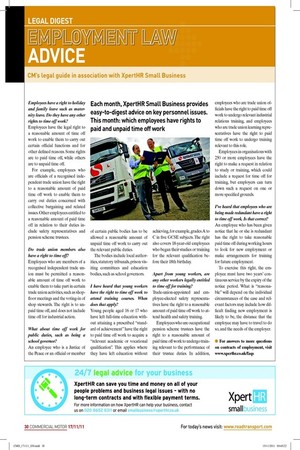ADVICE
Page 22

If you've noticed an error in this article please click here to report it so we can fix it.
CM’s legal guide in association with XpertHR Small Business Each month, XpertHR Small Business provides easy-to-digest advice on key personnel issues. This month: which employees have rights to paid and unpaid time off work
Employees have a right to holiday and family leave such as maternity leave. Do they have any other rights to time off work?
Employees have the legal right to a reasonable amount of time off work to enable them to carry out certain oficial functions and for other deined reasons. Some rights are to paid time off, while others are to unpaid time off.
For example, employees who are oficials of a recognised independent trade union have the right to a reasonable amount of paid time off work to enable them to carry out duties concerned with collective bargaining and related issues. Other employees entitled to a reasonable amount of paid time off in relation to their duties include safety representatives and pension scheme trustees.
Do trade union members also have a right to time off?
Employees who are members of a recognised independent trade union must be permitted a reasonable amount of time off work to enable them to take part in certain trade union activities, such as shoploor meetings and the voting-in of shop stewards. The right is to unpaid time off, and does not include time off for industrial action.
What about time off work for public duties, such as being a school governor?
An employee who is a Justice of the Peace or an oficial or member of certain public bodies has to be allowed a reasonable amount of unpaid time off work to carry out the relevant public duties.
The bodies include local authorities, statutory tribunals, prison visiting committees and education bodies, such as school governors.
I have heard that young workers have the right to time off work to attend training courses. When does that apply?
Young people aged 16 or 17 who have left full-time education without attaining a prescribed “standard of achievement” have the right to paid time off work to acquire a “relevant academic or vocational qualiication”. This applies where they have left education without achieving, for example, grades A to C in ive GCSE subjects. The right also covers 18-year-old employees who began their studies or training for the relevant qualiication before their 18th birthday.
Apart from young workers, are any other workers legally entitled to time off for training?
Trade-union-appointed and employee-elected safety representatives have the right to a reasonable amount of paid time off work to attend health and safety training.
Employees who are occupational pension scheme trustees have the right to a reasonable amount of paid time off work to undergo training relevant to the performance of their trustee duties. In addition, employees who are trade union oficials have the right to paid time off work to undergo relevant industrial relations training, and employees who are trade union learning representatives have the right to paid time off work to undergo training relevant to this role.
Employees in organisations with 250 or more employees have the right to make a request in relation to study or training, which could include a request for time off for training, but employers can turn down such a request on one or more speciied grounds.
I’ve heard that employees who are being made redundant have a right to time off work. Is that correct? An employee who has been given notice that he or she is redundant has the right to take reasonable paid time off during working hours to look for new employment or make arrangements for training for future employment.
To exercise this right, the employee must have two years’ continuous service by the expiry of the notice period. What is “reasonable” will depend on the individual circumstances of the case and relevant factors may include how dificult inding new employment is likely to be, the distance that the employee may have to travel to do so, and the needs of the employer.
● For answers to more questions on contracts of employment, visit www.xperthr.co.uk/faqs










































